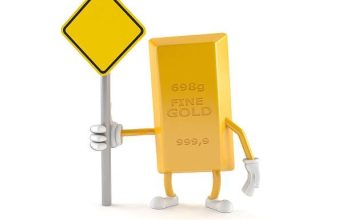Investing in a gold IRA allows you to buy gold and silver bullion without having to leave the United States. This way, there are no capital gains taxes on the profits you make from selling your investments. In addition, there are no income taxes on interest earned on your investment account.
The downside is that you don’t own the metal outright—you’re just renting it. If you want to sell your holdings, you’ll pay a 10% IRS fee plus a 3% sales commission. And, unlike a regular brokerage account, you won’t earn interest on your investment. However, since you don’t actually hold the metal, you can take out the cash whenever you like.
What makes gold valuable?

Gold is one of the oldest forms of money known to man. In fact, it has been used throughout history as a form of payment and store of value. Today, it continues to serve those purposes. However, it does much more than just provide a safe haven for wealth. Gold serves as a hedge against inflation, a way to diversify investments, and even a tool for trading currencies.
There are many reasons why investing in gold may be beneficial. Here are some of them:
Inflation protection
If you’re concerned about inflation, then gold is an excellent choice. It tends to increase in value when the economy grows. As a result, if you have invested in gold at any point over the last century, you likely saw significant returns.
Diversification
Another reason to consider gold is its ability to act as a form of diversification. When the stock market drops, investors often feel compelled to sell their stocks. But this doesn’t always happen. Sometimes, people choose to sit tight and ride out the storm. That means they could miss out on great opportunities. By adding gold to your portfolio, you ensure that you aren’t missing out on these kinds of gains.
Trading currency
Another benefit of owning gold is that it acts as a currency. You can use it to trade with other countries or individuals. For example, if you wanted to purchase something overseas, you could use gold instead of using another country’s currency. The same goes for individuals. If someone owes you money, you could ask them to repay you in gold rather than dollars.
Golden things to keep in mind about gold IRAs

The IRS allows investors to contribute up to $5,500 per year ($6,500 if you’re 50 or older). If you make contributions each year, you’ll receive a 10% bonus on top of that. For example, if you put $2,000 into your account every year, you’d get $2,100 in total. You can contribute money to a traditional IRA or a Roth IRA, though you must begin contributing no later than April 15th of the following year.
Gold IRAs are very popular because they allow people to invest in precious metals like gold without paying taxes on those gains. This makes it easy for investors to diversify their portfolios and avoid putting too much of their savings into one type of investment.
Here are some things to keep in mind about golden IRAs:
• Traditional IRAs do not offer a tax break on gains. However, you won’t owe income tax on gains from investments inside a traditional IRA. Instead, you’ll owe capital gains tax on the difference between what you originally invested and how much you sold the asset for.
• With a Roth IRA, you don’t have to worry about paying taxes on gains. But there’s a catch. When you withdraw funds from a Roth IRA, you’ll owe taxes on the amount withdrawn. So if you sell an investment inside a Roth IRA, you could end up owing tax on the profit.
• Unlike regular IRAs, golden IRAs aren’t subject to federal limits on withdrawals. You can take out as much money as you want from a golden IRA without worrying about running afoul of the law.
What does a gold IRA mean?
Gold IRAs are a great investment option because it gives investors access to gold while protecting against inflation. You don’t have to worry about losing purchasing power due to currency fluctuations, and you won’t have to pay capital gains tax on the value of your holdings.
There are several different types of IRAs, including traditional, Roth, SEP, SIMPLE, and rollover. Each type offers advantages and disadvantages depending on how much money you want to invest.
A gold IRA lets you buy gold bullion coins and bars directly from the government. This makes it easy to purchase gold without paying sales commissions or fees. With a gold IRA, you’ll receive a monthly statement showing the current market price of gold.
You can choose whether to hold your gold in a vault or keep it in your home safe. If you decide to store your gold in a bank, make sure to ask about storage fees. Some banks charge a flat fee each month regardless of how much gold you own. Others charge based on weight.
If you’re looking for a place to put your gold, consider buying shares in a publicly traded gold mining company. These companies often trade under the symbol “GLD.” GLD stands for “gold exchange-traded fund,” and it tracks the performance of the SPDR Gold Trust ETF (NYSEARCA: GLD).
The most common form of gold IRA is called a “traditional IRA.” In addition to allowing you to purchase gold, a traditional IRA lets you save up to $100,000 per person ($200,000 if married and filing jointly) without being subject to income limits. You can contribute up to $5,500 annually ($11,000 if you’re over 50), and you can withdraw your contributions and earnings at any time.
Should I buy gold coins or gold bullions?
Gold bullion and gold coins tend to be similar in terms of price per ounce and value over long periods of time. However, there are some differences between the two types of precious metals. Here we look into the pros and cons of buying gold bullion versus gold coins.
Pros of Buying Gold Bullion
1. Price Stability
Bullion prices are usually less volatile than coin prices. This is because bullion is priced based on supply and demand rather than fluctuating market conditions. For example, during times of economic uncertainty, investors tend to sell off their holdings of stocks and bonds, causing the prices of those assets to plummet. As a result, people rush to buy physical commodities like gold and silver in order to protect themselves against inflation. When the economy improves, however, people start investing again and begin selling off their investments. This causes the prices of stocks and bonds to rise. In contrast, the price of bullion does not change much even though the overall economy changes.
2. Portability
Another advantage of purchasing bullion is that it is easier to transport than coins. Coins are heavy and bulky, making them difficult to carry around. On the other hand, bullion is light and small enough to fit inside most pockets.
3. Easy Storage
Unlike coins, which need to be kept in a secure location, bullion doesn’t have to be stored in a specific way. It can be kept in a safe deposit box or in a jewelry box. This means that you don’t have to worry about where to store your gold coins.
4. Low Maintenance Costs
Because bullion is made of metal, it requires very little maintenance. Unlike coins, which require cleaning and polishing, bullion only needs occasional wiping down with a soft cloth.
Cons of Buying Gold Bullions
1. Limited Variety
Because bullion is typically purchased as an investment, its variety tends to be limited. Most stores offer only one kind of bullion, such as American Eagle coins. Although this type of bullion is generally considered more valuable than other kinds, it’s also more expensive.
2. High Cost
Buying bullion may seem like an affordable option, but it isn’t always the best choice. The high cost of bullion makes it harder to accumulate large amounts of wealth.
3. Lack of Investment Options
Although bullion has many advantages, it also has drawbacks. Unlike coins, which come in different sizes and designs, bullion comes in just one size and design. This makes it hard to diversify your portfolio.
4. Unnecessary Risk
Although buying bullion provides benefits, it also carries risks. Because bullion is so easy to transport, it’s susceptible to theft. If you lose your bullion, you’ll likely face a hefty fine.
What does an individual gold IRA cost?
An IRA account is one of the best ways to save money for retirement. However, it can be confusing to determine what type of IRA you are eligible for. There are several different types of IRAs, including traditional, Roth, SEP, SIMPLE, and Archer. Each type has specific requirements to qualify. In addition, each type of IRA requires a separate setup fee. Here’s how much you can expect to pay depending on the type of IRA you choose.
- Traditional IRA – Setup Fee: 0%
- Annual Administrative Fees: 2.5%
- Account Maintenance Fees: None
- Roth IRA – Setup Fee: None
- Annual Administrative Fees: 5%
- Account Maintenance Fees: None
Where is a good place to store gold?
The gold IRA industry is booming. But it’s also very complicated. You want to make sure that you choose the best gold IRA provider. Here are some questions to ask yourself before choosing one.
1. What type of gold do you plan to store?
You can buy physical gold bars or coins, or digital gold stored in a vault. If you decide to go with digital storage, make sure that the company you select provides 24/7 access to your gold. This way, you can check on your holdings whenever you need to.
2. How much money do you plan to invest?
This depends on how much gold you plan to store. A good rule of thumb is to start out with $10,000 worth of gold. However, you can always add more later. Just keep in mind that you won’t be able to withdraw the same amount of money from your investment each year. So, if you plan on withdrawing $5,000 per month, you’ll need to put away another $20,000 every year.
3. Do you plan to use the gold for investments?
If you don’t plan on investing in stocks, bonds, mutual funds, etc., then you probably don’t need to open a traditional IRA. Instead, consider opening a Roth IRA. With a Roth IRA, there’s no tax deduction because you aren’t taking money out of the account. Instead, you’re just putting money into the account.
Do Gold IRAs offer the best investment opportunity?
A gold IRA is a great choice for investors looking to diversify their portfolios. While it doesn’t provide exposure to the price of gold itself, it does allow you to invest in physical gold without incurring capital gains tax liability. This makes it easier to accumulate wealth while avoiding one of the biggest pitfalls of investing in gold.
A gold IRA offers several advantages over traditional 401(k) plans.
An IRA allows you to purchase physical gold without having to pay taxes on the profits. You can also choose how much gold you want to hold and receive monthly statements showing the value of your holdings. If you’re worried about inflation eroding the purchasing power of your retirement savings, a gold IRA could be a good solution.
An IRA lets you avoid paying taxes on the profits.
With a traditional 401(k), the earnings are taxed upon withdrawal. With an IRA, however, there is no taxation on the profits. This means you’ll save money on taxes throughout your lifetime.
An IRA gives you more control over your investments.
Traditional IRAs let you invest in mutual funds, ETFs, and other securities. But because you don’t actually own the assets yourself, you lose some control over the investments.
How does an IRA for gold work?
A gold IRA works much like a regular IRA. You contribute money to it, and over time, you can withdraw the funds without paying taxes. However, there are some key differences. For one thing, you don’t actually buy physical gold. Instead, you purchase shares of gold-backed ETFs. These are mutual funds that track the price of gold. When you open up an account, you’ll receive a certificate showing how many ounces of gold each fund owns. This is called the “share count.”
The biggest difference between a traditional IRA and a gold IRA is that you cannot use a traditional IRA to make tax-free withdrawals. With a gold IRA, however, you can do just that. In fact, you can take out your entire balance whenever you want, even if it’s early retirement age.
Fees associated with precious metals IRAs
The fees are based on the type of account you choose. There are three different types of accounts: Traditional IRAs, Roth IRAs, and SEP/SIMPLE IRAs. Each type has annual fees ranging from $195.00 to $1,095.00.
The monthly fee ranges from $0.01 to $10.00 depending on the type of account. A traditional IRA requires a $3.50 monthly fee; a Roth IRA requires a $9.95 monthly fee, and a SEP/SIMPLE IRA requires a $2.50 monthly fee.
Fees and costs associated with gold IRAs
Generally, there are three sets of fees associated with a gold Individual Retirement Account (IRA). These include the initial setup fee, annual maintenance fee, and sales commission. Gold IRA companies typically charge no upfront costs, but some do charge monthly fees. Some companies offer discounts if you sign up for multiple IRAs.
The initial setup fee varies depending on the type of account you choose. For example, most companies charge $100-$200 for a standard IRA. A few companies charge $1,500-$2,000. If you want to invest in precious metals, you might consider opening a Precious Metals IRA. You’ll find out how much it costs to set one up here.
Annual maintenance fees vary depending on whether you’re investing in bullion bars, coins, or both. Typically, companies charge around $50 per month for a basic IRA. If you decide to invest in bullion bars, you could end up paying anywhere from $25-$75 per month. Companies like American Bullion Group and APMEX charge around $125/month for their premium bullion IRAs.
Sales commissions vary based on what type of investment options you select. For example, the American Bullion Group charges 5% on gold purchases, while APMEX charges 3%.
Final thoughts
Investing in gold is a great way to diversify your retirement portfolio because it doesn’t lose value during inflation. Gold is considered a safe haven asset because it is hard to counterfeit. If you’re looking to build wealth over the long term, consider buying gold bullion coins and bars. They are easy to store and offer peace of mind knowing that your money is secure.
There’s no reason to stress over your retirement fund. You don’t need to worry about whether or not the stock market will go down. A gold IRA is a smart choice for investors who want to protect their savings from inflation and maintain control over how much risk they take.
You might think that investing in real estate is risky, but it isn’t always. There are plenty of opportunities out there to make good investments. Look for undervalued properties where you can improve upon what’s already there.
When investing in real estate, look for properties that are undervalued. Fix them up and sell them off. Then reinvest the profits into another property. Repeat this process until you’ve built enough wealth to retire comfortably.
Frequently Asked Questions
How much does a gold IRA costs?
The cost of an individual retirement account for gold varies depending on the type and amount of gold, but it generally ranges from $1 to $2 per ounce. The price is based on the current market value of gold at the time that the account is opened.
What is the average management fee for an IRA?
The average annual management fee for a traditional individual retirement account (IRA) ranges from 0.5 percent to 1 percent, according to Bankrate.com. The fees are deducted directly from your investment earnings and can be waived if you meet certain requirements, such as having at least $2,000 in assets or being age 50 or older.
What are the fees for a gold IRA?
The Internal Revenue Service charges no annual fee to open an Individual Retirement Account (IRA) that holds precious metals, according to the IRS. The only charge is a $25 transfer fee when you move money from another account into your new IRA.


